Life
Blast From the Anglo Indian Past
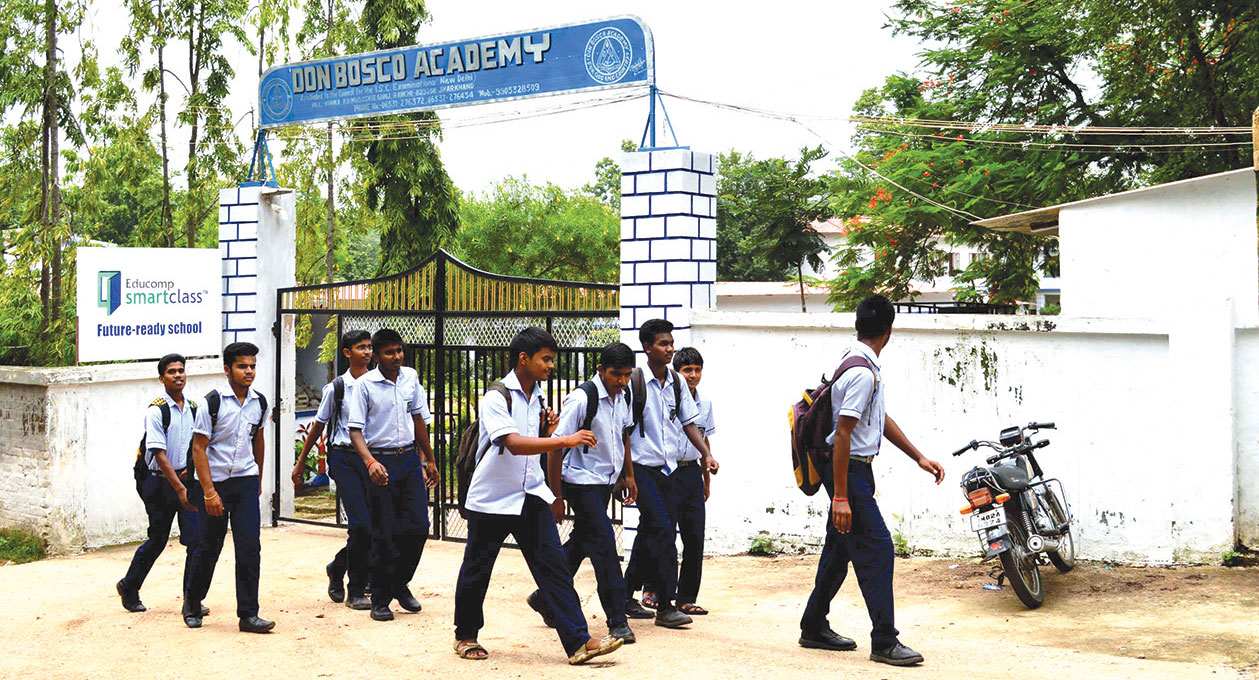
Students outside the Don Bosco Academy, created in part to provide employment opportunities to Anglo Indians.
Photo: Monirul Islam Mullick
Famed as the Little England of Jharkhand, McCluskieganj now lies in ruins.
The rumblings of the fast moving world and battle to outsmart others in the game of life seems inconsequential when one enters the silent and sleepy terrain of McCluskieganj where nature resides in its full glory.
Situated 60 kilometers from Ranchi, the state capital of Jharkhand in eastern India, McCluskieganj is known for its idyllic beauty and colonial bungalows built by the Anglo-Indian community, who put the town on the travel map of foreign tourists looking for a rendezvous with nature.
The town owes its name to Ernest Timothy McCluskie, an Irish-Indian property dealer based in Calcutta in the early 1930s.
Abhijit Biswas, a Kolkata-based historian, says that McCluskie used to visit villages in the area for hunting and even built a hutment in Harhu. “He wanted to build a separate settlement for Anglo-Indians retiring from the government services as the community members in those days were virtually employed in every government department,” he says. “His friend PP Sahib worked as the manager of Ratu Maharaja’s estate. It was PP who convinced Kumar Nand Kishore Nath Sahdev, the maharaja, to lease out the land to McCluskie.”
Biswas adds: “It was then decided that the Anglo-Indians could build their houses in nine villages on land not occupied by the original rahiyats (tenants) of those villages. It was also agreed that the settlers would not be allowed to acquire the rivers and the hill.”
In 1933, the Colonization Society of India (CSI) was formed and Ratu Maharaj signed an agreement with it. Nearly 10,000 acres were allotted for the new town, paving the way for the creation of McCluskieganj on 16 May, 1933.
Soon, many Anglo-Indians flocked to the town, lured by the prospect of a permanent base for the community. Nearly 350 families had settled in the town by the 1940s, earning it a sobriquet of mini England, adds Biswas.
The Anglo-Indian community had to toil hard as the town was then a dense jungle surrounded by wild animals, but soon their cuisine made the area popular.
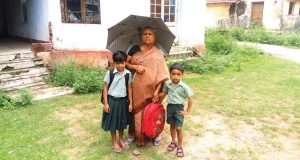
Nomita Gordon: “The local market remained chock-a-block with customers coming to enjoy the delicious preparations.” Photo: Monirul Islam Mullick
Nomita Gordon, a sexagenarian who shifted to town as a young bride over four decades ago, recalls: “Word soon spread about the cuisines being available here. People from neighboring and far-flung areas, including Ranchi, began to throng here for non-vegetarian and scrumptious dishes. The local market remained chock-a-block with customers coming to enjoy the delicious preparations.” Gordon runs a hostel and lives with her son and grandchildren in the town.
Several families migrated to England after Independence, but most decided to stay back as they had evolved into a close-knit family. Gordon says: “Life was smooth here and festivities were a community affair, celebrated leisurely in the Club House. Mass Prayers were organized on Christmas Eve and on Christmas Day. Christmas carols were sung amidst pealing of church bells and churches and houses were decorated with lamps.”
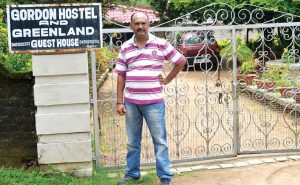
Nelson Paul Gordon: “We need to understand that the town was basically built for older generation and particularly for the retired people to help them spend the last days of their life in the lap of nature.” Photo: Monirul Islam Mullick
Lack of employment opportunities however prompted many youth to migrate. “We need to understand that the town was basically built for older generation and particularly for the retired people to help them spend the last days of their life in the lap of nature. No thought was spared about employment and other facilities. Such issues began to take the center stage when the new generation came up,” says Nelson Paul Gordon (44), whose grandfather William Paul Gordon, an engineer at Kamarhati Jute Mill in Kolkata, settled in the town in 1941.
The migration continued over the years and several families shifted out of the area, often opting for foreign shores for better employment and educational facilities for their children.
By the 1990s the population dwindled to just 15 households with 50 residents and even they contemplated leaving.
But then a savior came forward.
An Anglo Indian, Alfred George deRozario, was pained by the plight of McCluskieganj.
He established the Don Bosco Academy in the town in April 1997 with the aim of creating employment opportunities for the community.

Joshy T.D. Photo: Mirul Islam Mullick
Joshy T.D., assistant principal of the academy, who had joined the institution as a teacher two decades ago, says: “The whole purpose behind opening the school was to save the community from further migration and provide them with the source of livelihood.”
“Permission to run hostels for students was initially restricted to Anglo-Indians. It was hoped that students would come in large numbers from across the country and will need hostels for residence and food that would in turn create employment opportunities for the community,” Joshy said.
The gamble paid off. Students began to pour in from across the country and soon it became one of the most prestigious institutions in eastern India. The current strength of the school, which runs to Standard X, is more than 1,300,
Joshy said: “The institution has offered a new lease of life to the town by providing employment to hundreds of locals. Even people from other communities have opened hostels here after we allowed them. Several shops of daily commodities also opened up creating self-employment for unemployed people. Had it not been for the school, the situation would have been different.”
Today nearly 50 hostels thrive in McCluskieganj. Inspired by the success of Don Bosco Academy, several other educational institutions have also cropped up. The Janet Academy, with over 800 students, boasts of being the second largest school in the area.
Even so, McCluskieganj is still struggling. Its Primary Health Center is in dilapidated condition, Nelson Gordon says: “A medic comes from Ranchi, but he is not regular. The staff quarter for the doctors is in shambles. It is even difficult to get basic health services and patients have to be rushed to the state capital for treatment. Patients often die because of the delay in treatment. We have brought the matter before the health officials several times but nothing has been done so far.”
The town also has poor connectivity. There is no direct bus service to Ranchi. Residents say it is easier to reach Kolkata by train, 600 kilometers away, than the state capital, which is just 70 kms away.
Herald Mendis, 72,one of the oldest Anglo Indians in the town, recounts with pride that his grandfather, Alen Mendis started a direct bus service from McCluskieganj to Ranchi in the 1940s: “I have heard from my parents about my grandfather was the first to start the bus service. People used to travel in bullock cart and on horseback in those days. It used to take long hours to cover short distances. He was an innovative man who decided to start the bus service to shorten the traveling time.
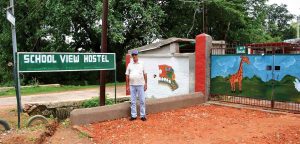
Herald Mendis: “I have been born here and lived all my life amidst the greenery and blissfulness. I can never imagine of going out from here.” Photo: Monirul Islam Mullick
He charged Rs 2.8 annas for the ride from here to Ranchi. The fuel was also cheap in those days. He ran the bus service till the late 1950s and then stopped it because of continuous breakdowns due to poor road conditions,” Mendis recalls.
He adds: “There is a direct rail connectivity from here to Kolkata, but it is very difficult to reach the state capital because of poor transportation. The place has huge potential for tourism, but it suffers because of transportation woes. The government should immediately address the issue.”
Like many other Anglo Indians, the septuagenarian runs a kindergarten and a hostel for students. Even though several of his family members have moved out, Mendis says he can never imagine leaving his birth place. “I have been born here and lived all my life amidst the greenery and blissfulness. I can never imagine of going out from here. I have already reached the autumn of my life and prefer to stay here till my last,” he says, his voice choking.
Most colonial era bungalows owned by the Anglo Indians have been sold.
McCkuskieganj, which once boasted 360 palatial houses has just 150 left, with many others in ruins.
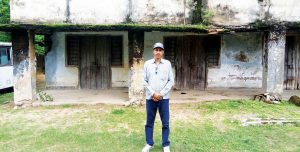
Kamal Kant Sharma. Photo: Monirul Islam Mullick
Kamal Kant Sharma, 35, who runs a guest house, says that the demography of the town has changed dramatically, with nearly 75 percent of the residents from other religions: “The Anglo Indians have mostly left and their bungalows have either become dilapidated or have been bought by other communities. Most of them had to be renovated, but the new owners have tried to keep the colonial symbols intact by not disturbing the basic structure.”
As dark clouds hover over the sky bringing heavy rains, in this land that served as the abode of nature, many of its original inhabitants have moved on in search of greener pastures.

1 Comment
You must be logged in to post a comment Login